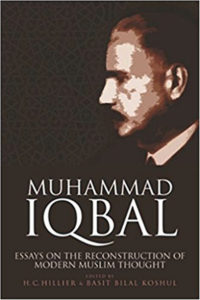
Muhammad Iqbal: Essays on the Reconstruction of Modern Muslim Thought
H. C. Hillier, Basit Bilal Koshul
Edinburgh University Press (2017)
Rs12,825
There are few moments in human history where the forces of religion, culture and politics converge to produce some of the most significant philosophical ideas in the world. India, in the early 20th century, was the setting for one of these moments, which saw the rise of activist-thinkers like Nehru, Jinnah, and Gandhi. One of the most influential members of the group was the poet-philosopher Muhammad Iqbal. Commonly known as the ‘spiritual father of Pakistan,’ the philosophical and political ideas of Iqbal not only shaped the face of Indian Muslim nationalism but also shaped the direction of modernist reformist Islam around the world. This work offers novel examinations of the philosophical ideas that laid at the heart of Iqbal’s own.
Basit Bilal Koshul is associate professor at the Lahore University of Management Sciences (LUMS) in Lahore, Pakistan. After teaching at Concordia College in Moorhead, MN for four years, he joined the Department of Humanities and Social Sciences at LUMS in 2006. The focus of his research is to recover the neglected resources in modern thought and religious tradition (especially scripture) that can help to transform the mutually debilitating dichotomies of religion and science, North and South, West and Islam, economics and ethics, security and rights into mutually enriching relationships.
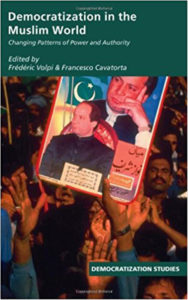
Democratization in the Muslim World: Changing Patterns of Authority and Power
Frederic Volpi and Francesco Cavatorta
Routledge (2007)
Rs13,741
This book examines the role that political Islam plays in processes of democratization in the Muslim world, detailing the political processes that facilitate the collective learning of democratic ways of solving the practical problems of those polities.
Democratization in the Muslim World represents an important contribution to the debate on democratization and political Islam that emphasises the synergetic effects and global reach of both Islamist and democratic politics. It comes to terms with the problematic relationship between Islam and democracy in the uncertain post-Cold War, post-9/11 world order by highlighting the malleability of Islamic discourses and of its institutional resources, as well as the diversity of the political strategies of incumbent regimes to remain in power. It combines key theoretical issues and country-specific studies of some of the most relevant Muslim polities of the post-Cold War and post-9/11 era.
This text was previously published as a special issue of Democratization and will be of interest to students of Middle East politics, governance, democracy, and human rights.
Frederic Volpi is currently research officer in the Institute of Development Studies at Sussex University, England.
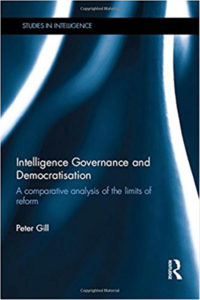
Intelligence Governance and Democratisation: A Comparative Analysis of the Limits of Reform
Peter Gill
Routledge (2016)
Rs16,489
This book analyses changes in intelligence governance and offers a comparative analysis of intelligence democratisation.
Within the field of Security Sector Reform (SSR), academics have paid significant attention to both the police and military. The democratisation of intelligence structures that are at the very heart of authoritarian regimes, however, have been relatively ignored. The central aim of this book is to develop a conceptual framework for the specific analytical challenges posed by intelligence as a field of governance. Using examples from Latin America and Europe, it examines the impact of democracy promotion and how the economy, civil society, rule of law, crime, corruption and mass media affect the success or otherwise of achieving democratic control and oversight of intelligence. The volume draws on two main intellectual and political themes: intelligence studies, which is now developing rapidly from its original base in North America and UK; and democratisation studies of the changes taking place in former authoritarian regimes since the mid-1980s including security sector reform. The author concludes that, despite the limited success of democratisation, the dangers inherent in unchecked networks of state, corporate and para-state intelligence organisations demand that academic and policy research continue to meet the challenge.
This book will be of much interest to students of intelligence studies, democracy studies, war and conflict studies, comparative politics and IR in general.
Peter Gill is Honorary Senior Research Fellow at the University of Liverpool, UK. He is the author of Policing Politics (1994), Rounding Up the Usual Suspects (2000) and co-author of Intelligence in an Insecure World.
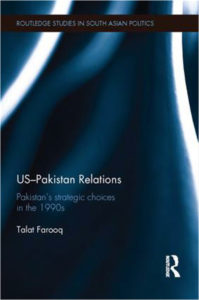
US-Pakistan Relations: Pakistan’s Strategic Choices in the 1990s
Talat Farooq
Routledge (2016)
Rs16,489
US foreign policy-making from the end of the Cold War to after 2001 is crucial to understanding the years of strong US engagement with Pakistan that would follow 9/11. This book explains Pakistan’s strategic choices in the 1990s by examining the role of the United States in the shaping of Islamabad’s security goals.
Drawing upon a diverse range of oral history interviews as well as available written sources, the book explains the American contribution to Pakistani security objectives during the presidency of Bill Clinton (1993-2001). The author investigates and explains the dynamics which drove Islamabad’s pursuit of nuclear weapons, its support for the Taliban and its approach towards the indigenous uprising in Indian Kashmir. She argues that Clinton’s foreign policy contributed to the hardening of Islamabad’s security perspectives, creating space for the Pakistani military establishment to pursue its regional security goals. The book also discusses the argument that US-Pakistan relations during this period were driven by a Cold War mindset, causing a fissure between US global and Pakistan’s regional security goals. The Pakistani military and civilian leadership utilized these divergent and convergent trends to protect Islamabad’s India-centric strategic interests.
The book addresses a gap in the relevant literature and moves beyond the available mono-causal explanations often distorted by a mixture of intellectual obfuscation and political rhetoric. It adds a Pakistani perspective and is a valuable contribution to the study of US-Pakistan relations.
Talat Farooq is a Research Associate in the Institute of Conflict, Cooperation and Security in the School of Government and Society at the University of Birmingham, UK.
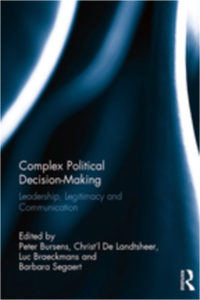
Complex Political Decision-Making: Leadership, Legitimacy and Communication
Edited by Peter Bursens, Christ’l De Landtsheer, Luc Braeckmans, Barbara Segaert
Routledge (2017)
Rs19,238
Political and societal elites are increasingly confronted with complex environments in which they need to take collective decisions. Decision-makers are faced with policy issues situated at different intertwined levels which need to be negotiated with different actors. The negotiation and decision-making processes raise issues of legitimacy, leadership and communication. Modern societal systems are not only affected by horizontal specialization and diversity but also by a vertical expansion of governance layers. The national level is no longer the sole, or even the most important, level of governance. In these complex environments, cognitive abilities and personalities of political and societal elites have gained importance.
This book addresses the impact of an increasingly complex environment on the legitimacy and transparency of polities, on the role of leadership and political personality and on motivated images, rhetoric and communication. Examining how these issues interact at the macro and theoretical level, the types of problems decision-makers face and how they communicate ideas with their audiences, it brings together leading experts in political psychology, law and political science to bridge the gap in the way these disciplines explore the issue of complex decision-making.
Peter Bursens is a professor of Political Science at the Department of Political Science of the University of Antwerp, Belgium. He also teaches at the Antwerp Management School and at the Université Libre de Bruxelles, Belgium, and holds a Jean Monnet Chair ad personam from the European Commission.
Christ’l De Landtsheer is a professor at the Department of Communication of the University of Antwerp, Belgium. She has taught at numerous institutions across Europe, Russia, the United States and China. Her interests are in the psychology of politics and political personality, as well as political rhetoric and metaphor.
Luc Braeckmans is a professor at the Department of Philosophy at the University of Antwerp, Belgium, and Chair of the Centre for Andragogy. He is also Director of Academic Affairs of the University Centre Saint-Ignatius Antwerp, Belgium.
Barbara Segaert is a scientific coordinator at the University Centre Saint-Ignatius Antwerp, Belgium.

